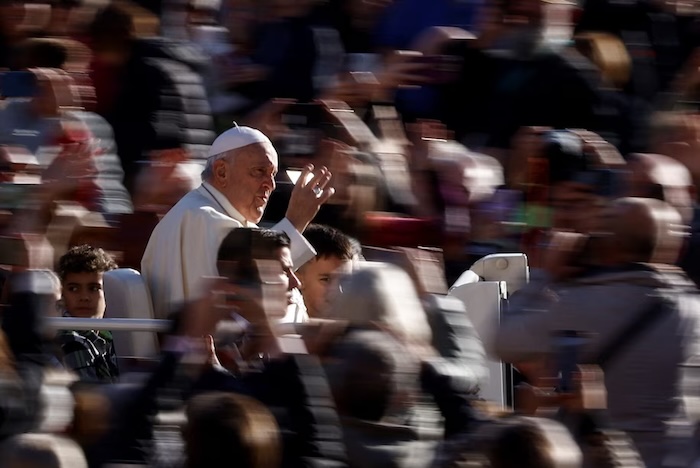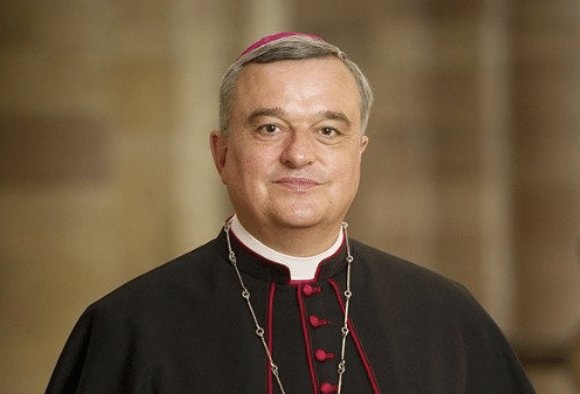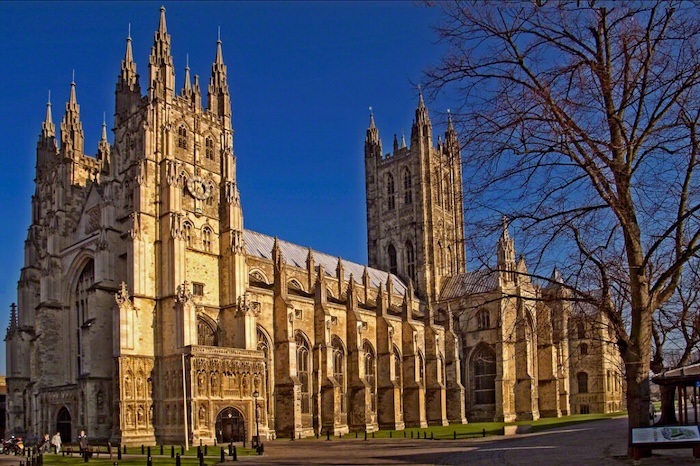
By Anthony Faiola and Kelsey Ables
The Vatican released guidance that says transgender people can be baptized, serve as godparents and witness weddings in the Roman Catholic Church, under certain circumstances, reflecting a continued opening by Pope Francis to the LBGTQ+ community.
The document, signed by Francis and Cardinal Víctor Manuel Fernández, was published on the website of the Vatican’s Dicastery for the Doctrine of the Faith on Wednesday. It responds to questions from a bishop in Brazil.
A transgender person “may receive baptism under the same conditions as other faithful,” so long as this does not cause “scandal or disorientation” among other Catholics, terms that were not further defined in the document, dated Oct. 31. It also says that transgender people “can be admitted to the role of godfather or godmother” and that “there is nothing” in canon law prohibiting transgender people from witnessing marriage ceremonies.
The guidance published by the Vatican is not new and largely stems from a “confidential note” on “transsexualism” published in December 2018, the Dicastery said. It was not clear whether parts of the guidance had been publicly shared before. It contradicts a 2015 ruling from the Vatican, which at the time barred a transgender man in Spain from becoming a godparent.
Francis has removed conservative officials who once led the powerful Dicastery on Vatican doctrine and placed Fernández, an Argentine cardinal considered close to him, at its helm. Last month, Fernández and Francis issued guidance that opened a door to blessings of same-sex couples, as long as a distinction was made with the sacrament of marriage.
Officially, however, the church still teaches that homosexuality is “intrinsically immoral and contrary to the natural law.” The pope’s continued outreach to the LBGTQ+ community comes after the first part of a major Vatican summit — or synod — ended in October with delegates deeply divided over outreach to gay people. The synod’s closing document failed to mention the phrase “LGBTQ+,” as used in preliminary materials and grouped the question of “sexual orientation” under “new” and “controversial” ethical issues, including artificial intelligence.
But the publication of the guidance this week was praised as a step toward inclusion by rights groups.
Sarah Kate Ellis, head of the LGBTQ+ media advocacy organization GLAAD, said in a statement that the affirmation “sends an unequivocal message to political and cultural leaders around the world to end their persecution and exclusion of transgender people,” and she praised Francis for “continuing to break down barriers.”
Francis DeBernardo, editor at the LGBTQ-focused New Ways Ministry, said welcoming transgender people more fully to Catholic sacraments is “a good step” but stressed, “that welcome needs to be expanded even more now.”
Same-sex couples cannot be married in the Catholic Church, and Catholic teaching condemns what it calls “homosexual acts” as “intrinsically immoral.” Given this context, Francis has surprised the public with statements going back to the early days of his papacy, when he said in 2013 “who am I to judge them?” in response to a question about gay priests. In January, Francis said that while he considers homosexuality a sin, it is not a crime. In October, he suggested an openness to priests blessing same-sex couples.
Benjamin Oh, co-chair of the Asia Pacific Rainbow Catholics Network, wrote in an email that the newly published document can be seen as “a sign of hope for LGBTIQA+ Catholics, that truth, justice and love can prevail,” stressing that “LGBTIQA+ people have been a part of every community in all human civilization, and that includes that of the Catholic church community.”
While the Vatican’s statement is new to most people in the community, Oh said there are already many baptized transgender Catholics, some of whom are godparents and godchildren, too. “The dichotomy of two opposing communities of LGBTIQA+ versus Catholic church is not an entirely truthful and helpful one,” Oh said.
Still, LGBTQ+ people face significant obstacles to full acceptance in the church, and churchgoers’ experiences can vary widely across dioceses and parishes, according to Human Rights Watch. The document released by the Vatican this week also appeared to raise questions about whether it is appropriate for same-sex couples living as spouses to become godparents, though it did not seem to shut the door entirely.
The U.S. Catholic bishops issued guidelines this year intended to stop Catholic hospitals from providing gender-affirming care. Some Catholic dioceses, smaller districts of the church, have enacted policies that prohibit students and workers at Catholic institutions from using the pronouns that match transgender students’ identities. One such policy in Massachusetts requires students to “conduct themselves at school in a manner consistent with their biological sex,” local media reported. Transgender teachers have been fired from Catholic schools after coming out.
Kori Pacyniak, who studies the religious experience of transgender Catholics at the University of California at Riverside, said in an email that the church’s relationship with the LGBTQ+ community has been historically fraught. They cited phrases by the church “referring to ‘homosexual acts’ as ‘intrinsically disordered’ and referring to so-called ‘gender ideology’ as harmful and evil.” But “even when official teaching harms LGBTQ people, that doesn’t mean that LGBTQ people are any less Catholic or less faithful,” Pacyniak said.
Pacyniak praised Francis for “trying to guide the church into a more welcoming place,” though such efforts are “often incredibly slow-going.” Still, Pacyniak added, just because there is more work to be done “doesn’t mean we shouldn’t celebrate the small steps along the way.”
Complete Article ↪HERE↩!




